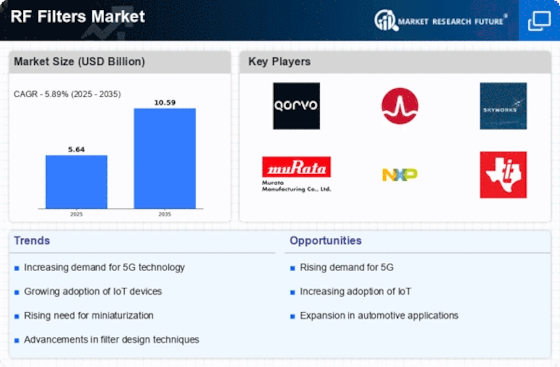Market Share
RF Filters Market Share Analysis
The growth of 5G technology has surged in recent months due to the rising demand for faster internet speeds across the globe. This escalation in demand has prompted a rapid increase in 5G field trials and installations by service providers. They aim to offer high-speed internet and advanced services to users. To support this technological advancement, semiconductor companies are investing heavily in constructing infrastructure capable of supporting 5G networks. The development and production of 5G chips are expected to create opportunities for manufacturers of RF filters in the coming years, thereby driving the growth of the RF filter market.
This shift is anticipated to boost the usage of RF filters in mobile phone communication, making it an attractive domain for RF filter manufacturers. Advancements in technology within the semiconductor industry have facilitated increased production of RF devices. However, the proliferation of new technologies has led to a congested RF filter spectrum, introducing complexities into the field.
In cellphones and various communication technologies, specialized RF filters play a crucial role. These filters are designed and employed to manage and optimize the transmission and reception of signals, ensuring reliable and efficient communication across different frequency bands. As technology evolves, the need for sophisticated RF filters becomes more pressing to address the challenges posed by crowded frequency spectrums, especially in the context of mobile communication devices.
The burgeoning demand for high-speed internet and the race to establish 5G networks have sparked a surge in the production and implementation of 5G-enabled devices worldwide. This includes the manufacturing of 5G chips, which is expected to bring about significant advancements in RF filter technology. These filters play a pivotal role in managing the complex and crowded frequency bands utilized by modern communication systems, particularly in 5G-enabled devices.
With the evolution of wireless technology, the spectrum utilized for communication has become increasingly congested. This poses challenges in terms of managing interference and optimizing signal reception. As a result, the demand for sophisticated RF filters capable of effectively handling these issues has intensified.
Moreover, as the semiconductor industry continues to innovate, it enables the development of more advanced RF devices and filters. These technological advancements are crucial for meeting the escalating demands for seamless and high-quality wireless communication in an ever-evolving digital landscape. Consequently, the evolution of RF filters remains pivotal in ensuring efficient and reliable communication across various devices and platforms in the age of 5G technology.
















Leave a Comment